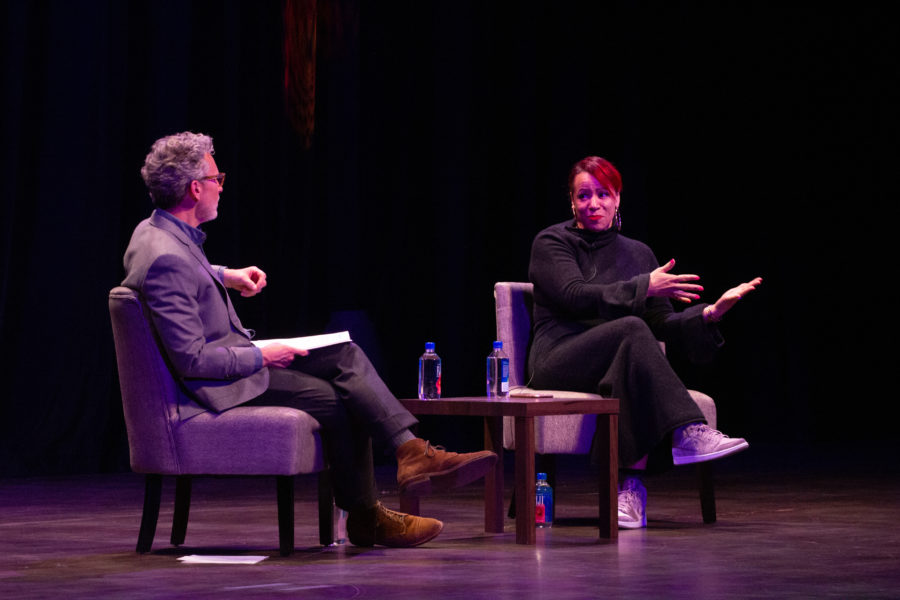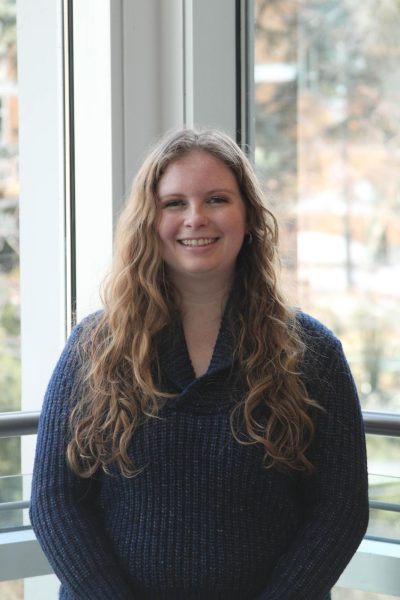Relearning history with “The 1619 Project” creator Nikole Hannah-Jones
Weber State University students and local community members filled into the Austad Auditorium in the Browning Center to see Howard University professor Nikole Hannah-Jones on March 31.
Hannah-Jones is a writer for the New York Times Magazine and won the Pulitzer Prize in 2020 for her polarizing essay on democracy and slavery, “The 1619 Project,” which was initially released as a cover-to-cover edition of the NYT in August of 2019. Among Hannah-Jones’ other awards, she has achieved the MacArthur Fellowship, three National Magazine Awards, and two George Polk Awards.
“The 1619 Project” tackles slavery and its relationship to the founding of the United States of America. The essay was later turned into a book that became a New York Times #1 best seller, as well as a six-episode mini docu-series on Hulu that premiered in January of 2023.
Doug Fabrizio, a KUER radio host, spoke with Hannah-Jones about the “The 1619 Project” in front of the packed auditorium.
Hannah-Jones went into depth on her upbringing in Waterloo, Iowa and where her interest in history began when she was growing up.
“I was just really fascinated by how people lived a long time ago … I was always just interested in how studying the past — why things were like how they were,” Hannah-Jones said.
When Hannah-Jones was 11 years old, she wrote a letter to the editor of her local newspaper in response to Jesse Jackson, a Black candidate that Hannah-Jones felt was a good presidential candidate, dropping from the 1988 United States presidential election. This letter was published in her local paper, and from there her interest in journalism was born.
Hannah-Jones told the audience she began her career as a journalist when she joined her high school newspaper and started as an investigative journalist when discovering the date 1619 in a book titled “Before the Mayflower.”
The first ship to bring African slaves to North America, named the “White Lion,” came in 1619 — just one year before the Mayflower arrived on North American soil. Hannah-Jones was shocked that this was never taught to her in school.
“We didn’t learn about that,” Hannah-Jones said. “I just realized in that moment that history is not what happened. History is what we are taught about what happened — we are taught to remember about what happened,” Hannah-Jones said.
Hannah-Jones’ goal with “The 1619 Project” is to get people to understand the reality of our country’s history and not the version of history we were taught was true. She feels that “The 1619 Project” has felt like something she has been building to her entire career as a journalist.
“I wanted to use this as an opportunity to do something really big,” Hannah-Jones said. “And not just talk about what happened all those years ago, but the way that what happened all those years ago would lay the foundation of our country that would come to be.”
Much of United States history has been purposefully mistaught, leading to a nation of citizens uninformed about the full history of their country. The goal of this project is to clear up those issues and bring forth a nation that is more aware of its past — both the ugly and the great.
“We traffic in transparency but don’t actually like being that transparent ourselves,” Hannah-Jones said.
After Hannah-Jones’ discussion with Fabrizio, a few WSU students got the opportunity to ask Hannah-Jones some questions.
The final question of the night asked Hannah-Jones what idea from “The 1619 Project” people should walk away with.
“That this nation owes not only a great moral debt to Black Americans, but a great financial debt to Black Americans.” Hannah-Jones said. “I want you to come away with a charge that we can alleviate the primary cause of suffering of Black people in this country.”
The final essay in the collective “The 1619 Project” deals with this issue of reparations.
“We have to make financial repairs. We have to pay that debt and it is a collective debt…you have to own the debt,” Hannah-Jones said.
Camyrn Taylor, a communications major at Weber State, first discovered “The 1619 Project” while browsing Hulu.
“I really enjoyed the series when I watched it a few months back. When I heard that she was going to come talk here, I felt that this would be a good chance to learn more about this project,” Taylor said. “The project … was really informative and moving. I could really tell that this was something personal to Nikole.”
On April 1, Hannah-Jones visited the Shepherd Union building for a book signing as well as a discussion co-hosted by the NAACP chapter with those who attended the meeting.












